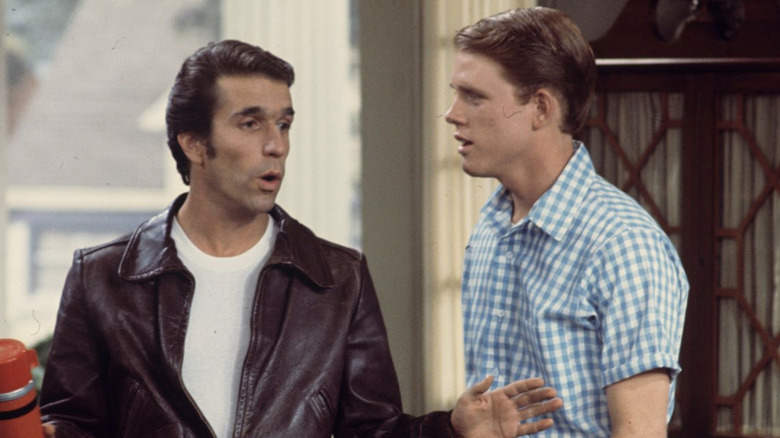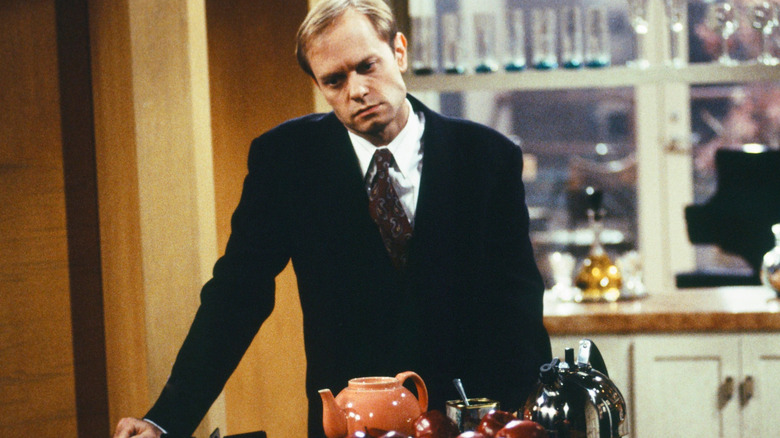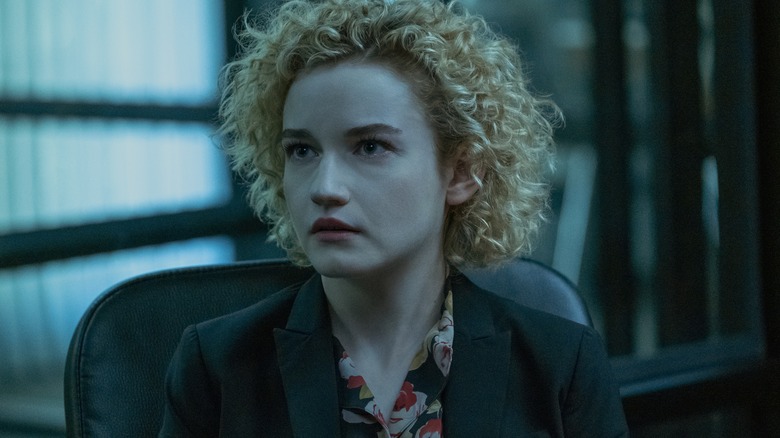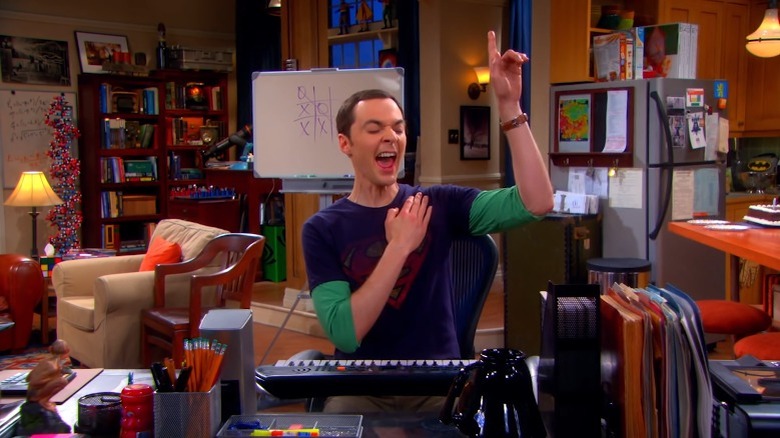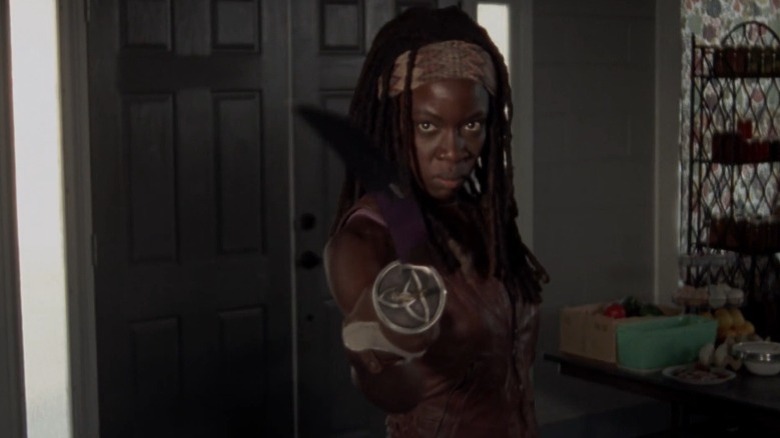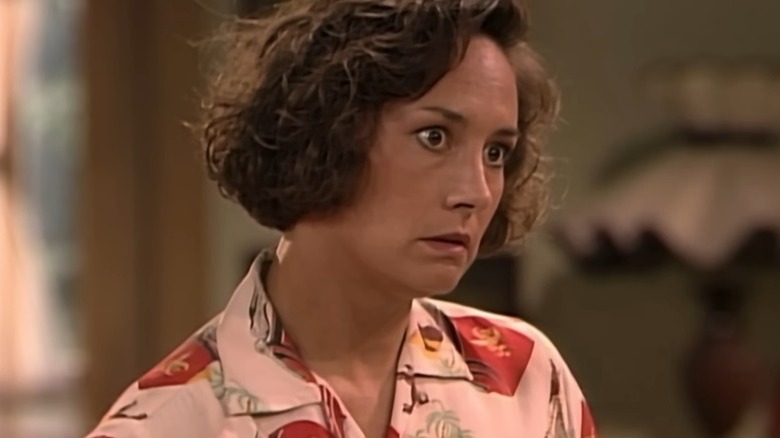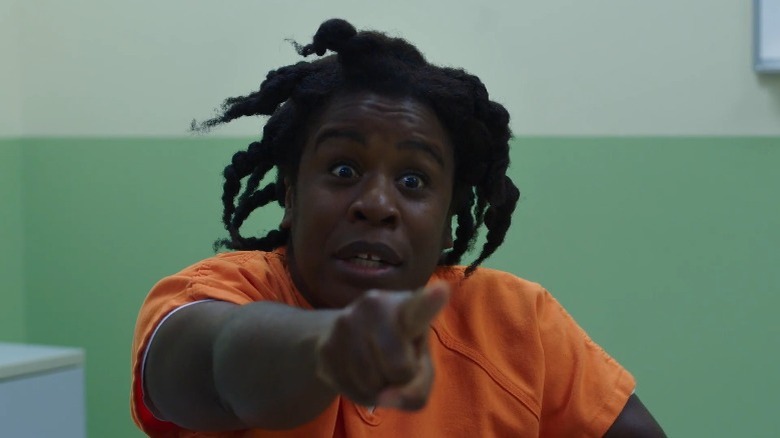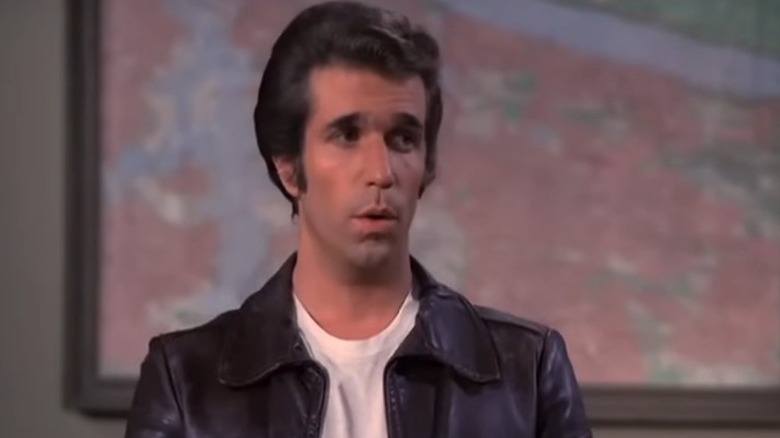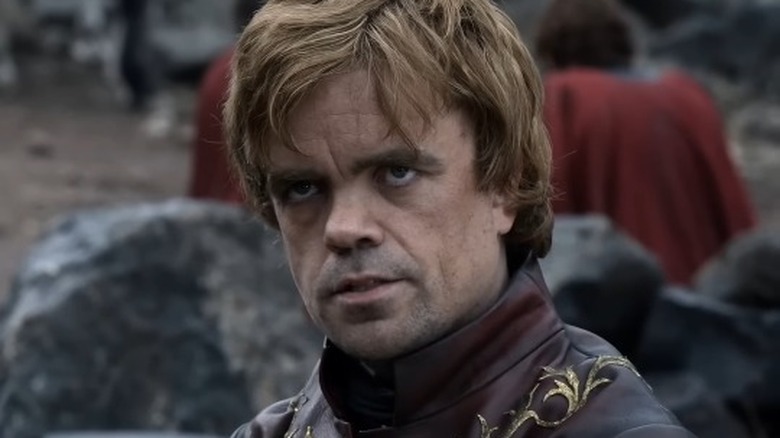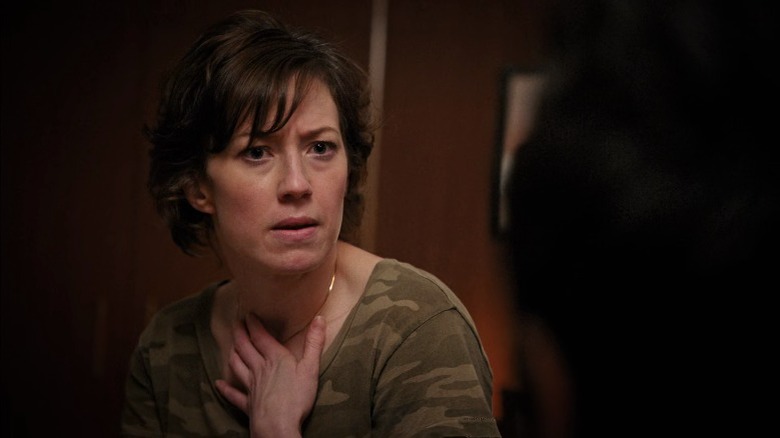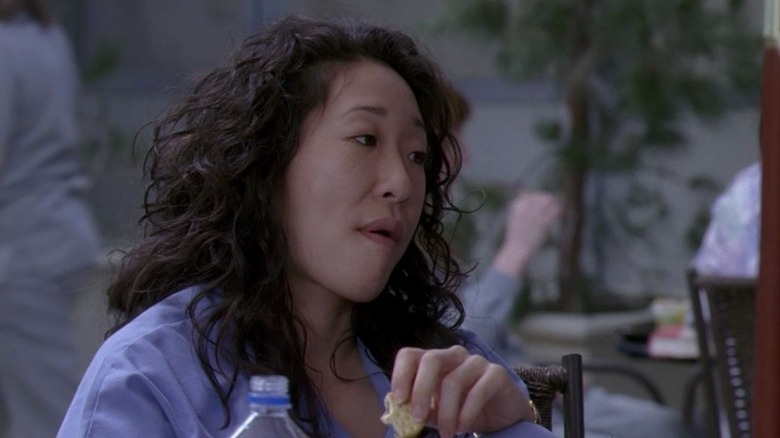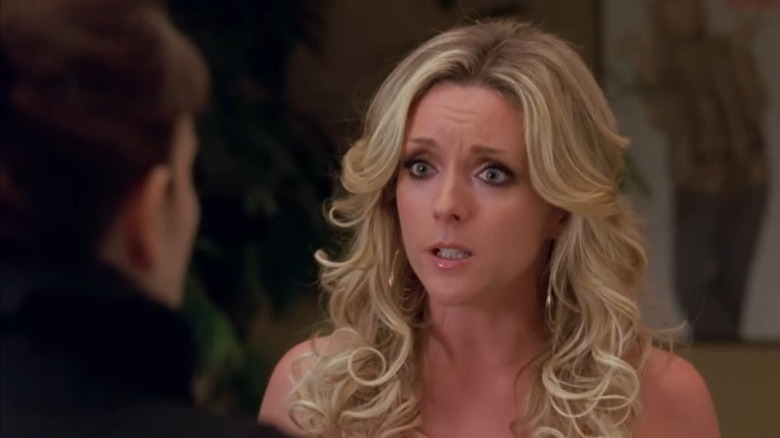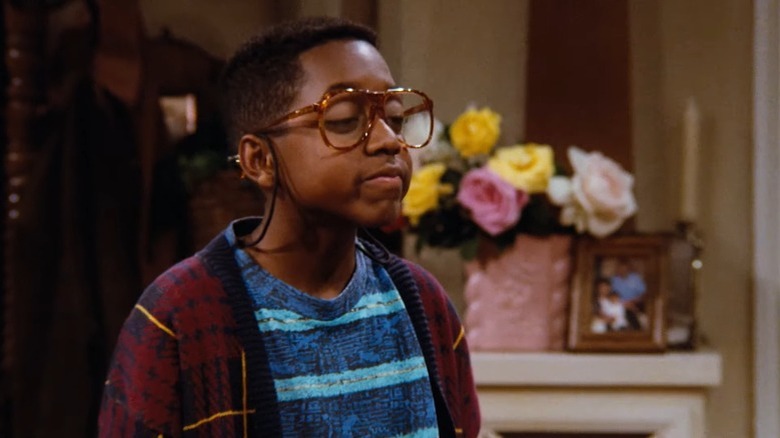12 Supporting TV Actors Who Stole The Show From The Lead
The beautiful thing about television is that it's a living medium. A writer or showrunner can work everything out in their head ahead of time, put all the pieces in place hoping for a specific audience reaction, and then find things to turn out completely differently in practice. There can, for instance, be a set intention to emphasize a certain character in the show's development — only for a supporting character with less screen time, less material, and less prominence in the plot to capture viewers' hearts.
There are too many cases of iconic breakout TV characters to count, but, here, we've compiled 12 particularly notable examples of supporting actors who gave such brilliant, attention-grabbing performances that they managed to steal the show right out from under the would-be leads. Some of them stayed as supporting players through and through, while some found such smashing success that they went on to become their shows' new protagonists over time. Some might even surprise you with the information that they weren't originally the leads.
David Hyde Pierce on Frasier
If NBC's "Frasier" was a concert hall of careful comedic structure in the cacophonous bustle of '90s multi-camera sitcoms, David Hyde Pierce was its first violinist. Although Kelsey Grammer naturally deserves props for the dexterity with which he fleshed out Frasier Crane and made him a viable protagonist of his own "Cheers" spin-off, it was Pierce's pitch-perfect work as Frasier's psychiatrist brother Niles that really cinched "Frasier'"s durability.
Eccentric and larger-than-life, Niles Crane was nonetheless a vanishingly rare thing in traditional sitcoms: A character defined — and made funny — by a wealth of thoughtful, three-dimensional characterization as opposed to just one or two ready-made archetypal traits. He had enough in common with Frasier to mark them convincingly as brothers, while also standing entirely on his own in terms of the reactions and the kind of humor he brought to the show.
If Frasier was an avatar of snootiness and crankiness, Niles doubled down, proudly embracing the kind of upper-class posturing that his older brother made an effort to temper with a little more folksiness, and somehow projecting even more charisma and authenticity through his adamant refusal to chase either. The funniest and sharpest cultural jokes and psychiatric observations on "Frasier" came from Niles, as did the most memorable one-liners — yet he was also, in multiple ways, the show's most human and generous character. And Pierce made a full-course meal of it all week after week, holding "Frasier" together as both head and heart.
Julia Garner on Ozark
Starring Jason Bateman and Laura Linney as heads of a deceptively "average" suburban family whose livelihoods are propped up by white-collar crime, Netflix's "Ozark" was an audience hit, but was sometimes accused by critics of cribbing from the "Breaking Bad" crime caper playbook a bit too mechanically. If there was one element of the show that unquestionably breathed life into it and made it stand out from the crop of prestige TV antihero dramas, however, it was Julia Garner's performance as Ruth Langmore, the local petty criminal who becomes one of the Byrdes' closest cohorts.
Hard-edged, embittered by rough family life, and constantly underestimated by those around her, Ruth used confidence, attitude, and a poet's command of profanity-laden intimidation to make a space for herself in the criminal underworld of the Ozarks. If the show's ensemble could sometimes be a desert of likability, Ruth's redemption arc across four seasons ultimately made her one of the most likable main characters on "Ozark" — all by way of Garner's expertly nuanced work.
Excellent as Linney and Bateman may have been, their younger co-star put on such a fireworks show portraying Ruth's singular physicality and iconic tirades that "Ozark" quickly became The Ruth Langmore Hour; not for nothing, she was the only "Ozark" cast member to win Primetime Emmys, taking home the outstanding supporting actress in a drama series award three years in a row.
Jim Parsons on The Big Bang Theory
Seventeen years later, you might not even remember this, but when "The Big Bang Theory" originally premiered on CBS in September 2007, it was intended as a show centered around Leonard Hofstadter (Johnny Galecki) — with his best friend and roommate Sheldon Cooper (Jim Parsons) as a foil. Not only was the show's unaired pilot hard to watch for the much more generic, uninteresting, and creepy characterization it gave Sheldon, but, even when "The Big Bang Theory" got reworked into the show we came to know, the earliest episodes of Season 1 were still generally focused on Leonard and his blossoming dynamic with Penny (Kaley Cuoco).
As time went by, however, it became clear that Parsons' unique, neurotic, utterly self-possessed performance was the show's winning lottery ticket. "The Big Bang Theory" gradually shifted its attention more and more toward Sheldon, to the point where the average episode a few seasons in would usually be driven by whatever new obsession or plan or goal he was up to that week. Although "The Big Bang Theory" eventually settled into a more evenly distributed ensemble comedy format that allowed it a stunning longevity, it was arguably Parsons as Sheldon who first catapulted the show into the upper echelons of TV popularity.
Danai Gurira on The Walking Dead
At its best, AMC's "The Walking Dead" was a series in which the imperative of survival gave the storytelling a simple, elemental charge — with mood, imagery, and action mechanics driving the plot and the characterizations instead of dialogue. Being a memorable character in the show's rough-hewn world was about making a strong impression. And nobody across the 11 seasons and 177 episodes made a stronger impression than Danai Gurira as Michonne.
"The Walking Dead" had its share of memorable supporting characters who stole the thunder from Rick Grimes (Andrew Lincoln), but, from the moment she first appeared onscreen on Season 3, clad in a face-concealing gray cloak and dragging two walkers in chains behind herself, Michonne was a positively hypnotic presence. A lone survivor accustomed to solitude and self-reliance, she was more composed, steely, and unflinching than anyone else in the ensemble when it came to protecting herself and her loved ones. Her prowess with the katana made her the most exciting character by far to watch in action mowing walkers (and occasional humans) down.
And, through it all, Gurira's phenomenally expressive, precise, and charismatic performance made sure that Michonne's status as the resident stoic master warrior of "The Walking Dead" never subtracted one bit from her depth and personality. It's no wonder that, on a rewatch, the show doesn't quite feel like it gets going until Michonne shows up, and never feels the same again once she leaves the picture.
Laurie Metcalf on Roseanne
ABC's "Roseanne" is a fascinating case study in the pantheon of hit '80s and '90s sitcoms. While ostensibly centered around and driven by the boisterous persona of a hit comic like so many shows of that era, it surrounded Roseanne Barr's Roseanne Conner with two titans of the stage who would go on to rank among the most iconic and beloved American actors of all time. John Goodman brought a degree of poise, warmth, and lived-in humanity to Dan Conner that was extremely rare among sitcom family patriarchs. And then there was Laurie Metcalf as Jackie Harris — the heart and soul of "Roseanne" for pretty much the entirety of its run.
Jackie was a gratifyingly complex and layered character by traditional sitcom standards: A messier, angstier, less successful younger sister who remained steadfast in her loyalty and support for her nieces and nephews no matter how chaotic her own life got. Her relationship with Roseanne was thorny and volatile yet unshakable like a real-life sister dynamic; her personality was by turns expansive and anxiously implosive; her presence radiated a warmth and a dry sense of humor that made every scene better, even when all she did was stand around and react to the other characters. Metcalf, for her part, was consistently hilarious in the role, yet also utterly heartbreaking when her dramatic chops were called for. Not every "Roseanne" viewer was on the comic wavelength of Roseanne herself — but absolutely everybody loved Jackie.
Uzo Aduba on Orange Is the New Black
It was by design, and through no fault of Taylor Schilling herself, that Piper Chapman was the least interesting character on "Orange Is the New Black." The whole point of the Netflix show was that it was the story of a woman who finds herself overwhelmed by the enormity of what she doesn't know and doesn't understand in the world, including scores of women more seasoned and more full of personality. But even the other Litchfield inmates usually found themselves playing second-fiddle when Uzo Aduba appeared onscreen as Suzanne "Crazy Eyes" Warren.
Deliberately presented in a deceptive way to viewers as a character marked by eccentricity and mental instability, Crazy Eyes was gradually revealed as a brilliant, deeply resourceful, and creative woman mistreated by a world that didn't know how to handle her neurodivergence — the most intensely tragicomic figure in a cast filled with tragicomic figures. Although Aduba effortlessly scored belly laughs whenever Suzanne's manic side came to the fore, she also inhabited Suzanne's hunger for affection and belonging with gut-wrenching mastery, pulling off a thoroughly vivid, believable, and three-dimensional portrayal of a character who would have been exceedingly easy to get wrong. When all was said and done, she was unmistakably the face of "Orange Is the New Black" — which is saying a lot for a show that teemed with incredible characters.
Henry Winkler on Happy Days
"Happy Days" was a sitcom about teenager Richie Cunningham (Ron Howard) and his life growing up in Milwaukee, Wisconsin, in the 1950s, with storylines primarily focusing on his parents, his siblings, and his best friends Warren "Potsie" Weber (Anson Williams) and Ralph Malph (Don Most). But you don't remember it that way, of course. Unless you have a particular attachment to the first couple of seasons, you, like everyone else, remember "Happy Days" as the Fonzie show.
Although Arthur "Fonzie" Fonzarelli was initially intended as just a recurring character with limited participation in the storylines, Henry Winkler's performance became so seismically popular that "Happy Days" was gradually retooled to become all about him. By Season 2, he'd been upgraded to series regular; by Season 3, he was being incorporated into the Cunninghams' family life and getting as much screentime as Richie; by Season 8, he was the main character. Something about Winkler's suave, confident, lightly scoundrelly interpretation of a mid-century bad boy struck a chord with America in the '70s; there's an argument to be made for him as the single most notorious breakout supporting character in TV history. This is extra impressive when you consider that Winkler was struggling with dyslexia while playing Fonzie.
Peter Dinklage on Game of Thrones
Following a first season deceptively centered around Ned Stark (Sean Bean), Season 2 established HBO's "Game of Thrones" as a radically ensemble-driven affair, where no one was too important or too central to get the ax — at least until later seasons shifted things back to a more conventional plot-armored protagonist format. But even as Daenerys Targaryen (Emilia Clarke) and Jon Snow (Kit Harington) emerged as the new leads, there was never any question as to who was the MVP of the ensemble, and that was Peter Dinklage's Tyrion Lannister.
Dinklage's four-time Emmy-winning performance as the snarky, wickedly intelligent, morally conflicted younger Lannister sibling was so stunningly perfect — such a dream come true for fans of George R. R. Martin's "A Song of Ice and Fire" — that Tyrion's role was significantly expanded from the books as the seasons progressed (and the show didn't cut off his nose at Blackwater Bay, to boot). His character made the reputation of "Game of Thrones" as a smart, incisive political show to such a degree that later seasons ended up exaggerating Tyrion into an unbelievably unerring voice of reason, all the way up to the infamous series finale on which the kingdom of Westeros collectively decided to let Tyrion pick a new king and a new political system, for not entirely discernible reasons. Writing quality decay aside, though, when "Game of Thrones" was firing on all cylinders, there was no TV performance more compelling than Dinklage's.
Carrie Coon on The Leftovers
It has become a critical cliché to say that Seasons 2 and 3 of HBO's "The Leftovers" found a new pulse by trading the dourness of Mapleton, New York, for the airy Jarden, Texas, of Season 2 and the globetrotting of Season 3. And although that argument is not entirely incorrect, even more crucial to "The Leftovers'" reinvention was Carrie Coon's upgrade from breakout supporting actress to de facto protagonist.
Coon's performance as Nora Durst, the Mapleton woman who lost her entire family in the Sudden Departure and subsequently became a walking pile of neuroses and unhealthy coping mechanisms hidden behind a façade of cynical toughness, would be a strong contender for best TV performance of the 21st century. That was apparent even in Nora's smaller Season 1 appearances when she was a peripheral element in the show's darkly vibrant world-building. By Season 2, Coon was so blatantly the best part of "The Leftovers" that it only made sense for Lindelof and Perrotta to bring her to the center of the stage.
Once they did, refining "The Leftovers" into an up-close study of Nora Durst's frayed psyche and her jittery ballet with Kevin Garvey (Justin Theroux), Coon's acting reached such ferocious, jaw-dropping heights that the series essentially became TV's response to a '70s Gena Rowlands star vehicle. Coon was never nominated for Emmys for her work as Nora, but she did win the lifelong allegiance of anyone who took the time to watch "The Leftovers."
Sandra Oh on Grey's Anatomy
"Grey's Anatomy" has been on TV for so long now that it already counts more showrunners across its run than most series do regular actors. As for regular actors, well, there have been a grand total of 39 at the time of writing. Naturally, every fan of the show will have their darlings, and they can range from a single supreme favorite to an entire roster of S-tier actors and characters. But Sandra Oh as Cristina Yang is something else: A "Grey's Anatomy" character everybody — even non-fans of the show — seems to like.
Oh, an acclaimed Canadian indie film actress whose "Grey's Anatomy" audition almost landed her in a different role, was an absolute supernova on the show, burning through the screen whenever and wherever she appeared. Cristina's profound, fiercely loyal friendship with Meredith Grey (Ellen Pompeo) was the soul of the series; her hard-yet-vulnerable personality was its most vital cast ingredient; her ultra-dry sense of humor was the source of its heartiest laughs; her impassioned pursuit of career goals was its most engrossing non-romantic plot engine. "Grey's Anatomy" fans have had to endure a lot of cast departures over the years, but Oh leaving was the ring of the bell that signaled there was no going back: Sans Cristina, the show had definitively become something new.
Jane Krakowski on 30 Rock
Some folks like to get away, take a holiday from the neighborhood, hop a flight to Miami Beach or to Hollywood. But Jane Krakowski didn't even have to leave the confines of 30 Rockefeller Plaza to make history as Jenna Maroney, the funniest character on "30 Rock." Although a lot of the show's storytelling hinged on the power quartet of Liz Lemon (Tina Fey), Jack Donaghy (Alec Baldwin), Tracy Jordan (Tracy Morgan), and Kenneth Parcell (Jack McBrayer), Jenna was arguably the key component of its showbiz satire: A character who, in her proud superficiality, amorality, and vicious pursuit of fame at any and all costs, effectively embodied the entertainment industry.
The number of absurd comedic ideas thrown Krakowski's way over the course of "30 Rock" was too great to count; a single average episode could ask her to mug, belt out high notes, stage pratfalls, deliver the world's driest one-liners, read out whole pages of dialogue in one take, act out multiple psychological meltdowns — and do it all as funnily as possible. And, well, to say that Krakowski rose to the challenge would be an understatement. She devoured the role of Jenna with a gusto rarely seen elsewhere in TV history, whether in comedy or drama, finding the exact energy, intonation, and physicality for every character beat and cartoonish gag. Every "30 Rock" cast member was a superstar, but Krakowski was a legend among legends.
Jaleel White on Family Matters
Here's another piece of television lore that time (almost) forgot: "Family Matters" began as a spin-off of "Perfect Strangers." What's more, it began as a spin-off focused on Harriette Winslow (Jo Marie Payton), an elevator operator in the Chicago Chronicle building. At first, "Family Matters" was focused primarily on the Winslow family, consisting of Harriette, her husband Carl (Reginald VelJohnson), their three children, and Carl's mother Estelle (Rosetta LeNoire). Steve Urkel (Jaleel White), believe it or not, was originally intended as a one-off character.
Needless to say, that's not exactly how things panned out. Urkel first appeared as an eccentric nerdy boy who asks Laura Winslow (Kellie Shanygne Williams) out to a dance, but, thanks to a show-stopping performance by White, he was subsequently brought back for several more appearances on Season 1. Then, in Season 2, White joined the regular cast in an official capacity, with the show positioning him as a constant source of trouble and annoyance for the Winslows. It wouldn't be long until Urkel's massive audience popularity prompted the writers to give White more and more material, culminating in him becoming the protagonist of "Family Matters." It's no wonder, either — while the whole cast of "Family Matters" was strong and the show as a whole is severely underrated in the pantheon of family sitcoms, it's hard to think of many performances more iconic than White's in American TV history.
